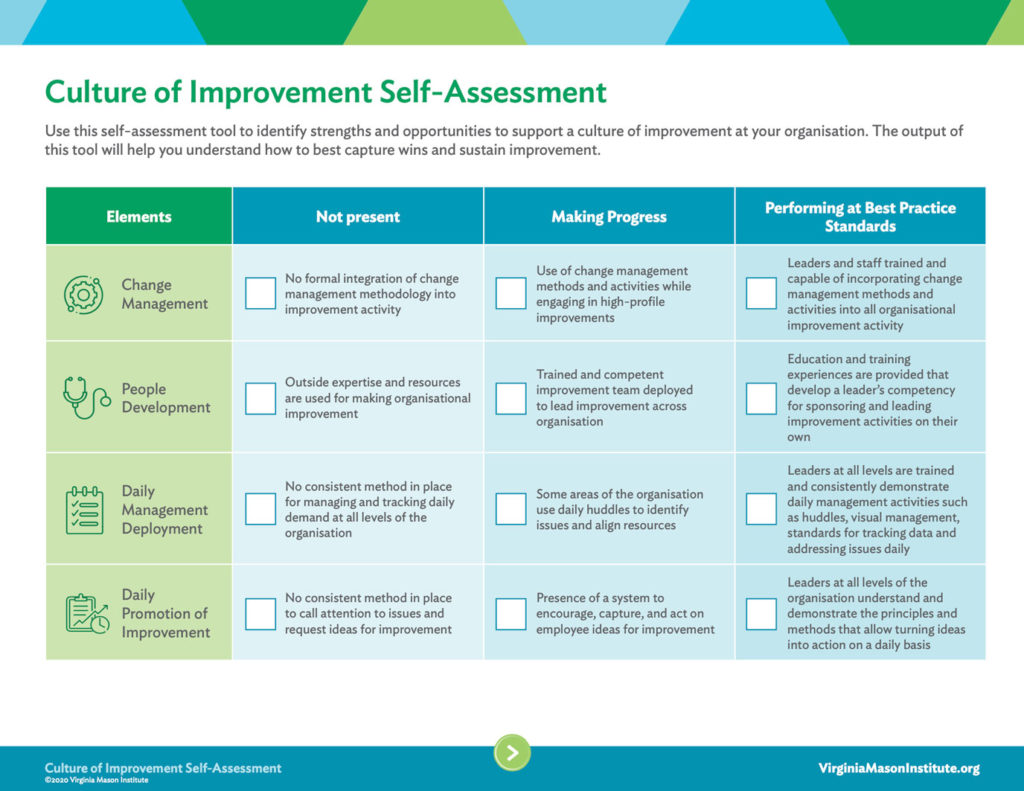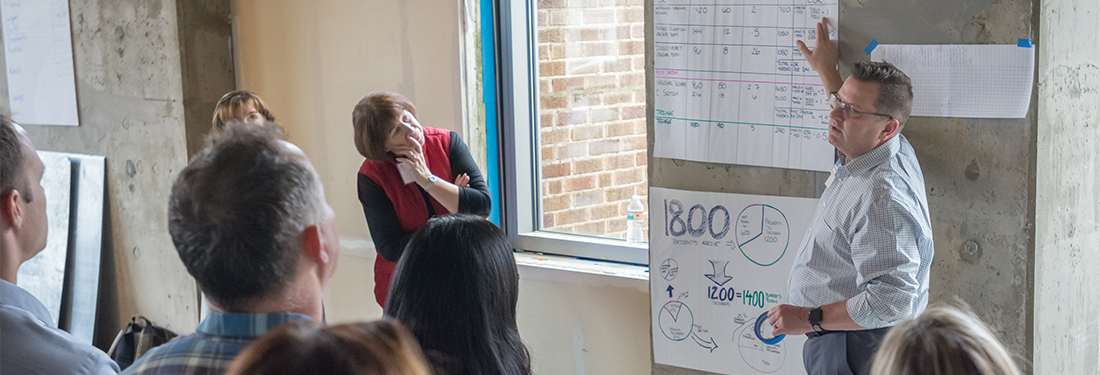What is the Virginia Mason Production System (VMPS)? Introduction and Assessment Questions
In 2002, at the start of a journey to provide the perfect patient experience, Virginia Mason created the Virginia Mason Production System® (VMPS), a lean management methodology based on the principles of the Toyota Production System (TPS). We realized early on in our transformation journey that our current management approach was not nimble enough to keep up with the changing and challenging health care environment, and we knew we needed a method to achieve our imperative of putting the patient first, leading with quality and remaining an economically viable organization. Today at Virginia Mason Franciscan Health, as Donna Smith, MD, President, Franciscan Medical Group and Senior Vice President, Virginia Mason Franciscan Health, explains in A Leadership Journey in Health Care: Virginia Mason’s Story, “we have the courage to be inspired by zero defects. We have the courage to try things and learn from failure and the courage to use a method that allows the people who know the work best to be truly heard and contribute to improving work in a way that others might not be able to.”
For Toyota, TPS provides a unified way of thinking and acting through a set of philosophies and practices that have been tested for more than half a century. Like TPS, VMPS was built on the foundational belief that by eliminating waste, organizations will improve quality and safety and reduce costs for patients. It is from this belief that the five-part VMPS philosophy was created:
- Patient Is Always First
- Focus on Highest Quality and Safety
- Engage All Employees
- Strive for Highest Satisfaction
- Maintain a Successful Economic Enterprise
A key element of VMPS is understanding that it is not a short-term cost-containment strategy, a series of projects or a set of tools. It is a long-term philosophy — a complex socio-technical system that has shaped our culture to one relentlessly focused on high quality, zero defects, exceptional service, innovation and respect for people.
How can your organization attain such a culture?
Patient Is Always First
The patient-first philosophy at Virginia Mason is very visible. The patient is at the top of our strategic plan and is the impetus for our physician, leader and board compacts. In fact, we define value from the patient perspective. This has allowed us to make several breakthroughs in the way we deliver care — from embedding the patient voice into value streams to engaging patients directly in our continuous quality improvement work. Being patient-first serves as a compass when aligning priorities and engaging team members.
A question to consider in your organization: For the most part, every organization believes they put the patient first — it’s why they come to work every day. Think of the last few decisions made in your organization by you or your leadership team. How was the patient’s perspective included in the decision-making process?
Focus on Highest Quality and Safety
Our studies at Toyota revealed that each worker has the power to pull an andon cord and “stop the line” in order to remove defects and improve processes. At Virginia Mason, all employees are empowered to be quality and safety inspectors. To achieve defect-free health care we need to ensure that all staff feel comfortable speaking up freely, which is why Virginia Mason now has over 5,000 inspectors that can catch a mistake. One tool used to capture safety alerts is our Patient Safety Alert System™. We also use our Everyday Lean Ideas (ELI) system to engage staff in daily improvement work and leverage the people that know the work the best so that they can make it better.
Focusing on the highest quality and safety means pursuing zero defects in health care by removing waste and designing mistake-proofed processes. The tools of the Virginia Mason Production System support this work, but it is the culture that sustains it.
Questions to consider: Quality and safety are a key focus for every organization, yet many believe zero defects is unattainable. Does your leadership team believe zero defects is achievable? Does every employee in your organization feel empowered to “stop the line” as a quality and safety inspector? If you were a patient, how many defects would you consider acceptable in the delivery of your care?
Focusing on the highest quality and safety means pursuing zero defects in health care by removing waste and designing mistake-proofed processes. The tools of the Virginia Mason Production System support this work, but it is the culture that sustains it.
Engage All Employees
Connecting the dots of organizational performance to work on the front line is fundamental in VMPS. Making sure staff engage consistently with VMPS requires leaders who are out on the front lines, discussing the organizational priorities and opportunities for improvement — and receiving feedback from staff on how they can help Virginia Mason achieve its organizational goals. This starts with ensuring all staff have basic training in VMPS as part of their onboarding at Virginia Mason and is supplemented through interactions with their managers during training (through standard work, for example), team huddles and weekly meetings focused on staff updates and connections to the strategic plan. Engaging employees also means including staff as key team members in improvement work, such as formal events ranging from one to five days or through coaching of an ELI. VMPS improvement work is happening continuously; it is part of the operational work and is done by the actual teams, not a separate lean department.
In addition, executives have standard work for rounding throughout the organization. Senior leaders spend time engaging staff where they work to listen and solicit feedback and opportunities for making their departments and the whole organization better.
Questions to consider: How are staff engaged in improvement work in your organization? Are changes “done to” staff or with them? Consider going to the work area and asking for feedback from staff on how they experienced the last change.
Strive for Highest Satisfaction
This philosophy is closely related to the first two tenets and reflects our organization’s focus on fostering a culture of respect and creating the perfect patient experience. Waste reduction directly impacts our staff by removing burdensome work and by educating, listening to and including staff in improvement activities so that they feel a sense of ownership and value. Patients benefit because wastes such as waiting, poor service and defects prevent them from achieving the health care outcomes they desire.
We monitor staff engagement as it directly connects to patient satisfaction and have seen year-over-year gains. Respect for People is the formal initiative at Virginia Mason that ensures a safe and respectful environment for patients and staff. Having a culture of respect, trust and transparency makes it possible to apply the tools of VMPS. This enables our teams to make improvements without staff feeling fearful of losing their jobs or not having input into their future. We also offer patients the opportunity to engage in our improvement events, especially those who may have had a less-than-perfect interaction with our system.
Questions to consider: Every day, is everyone in your organization treated with respect, regardless of position, education or pay? Does everyone in your organization have the education, training, tools and support to develop to their full potential? Is everyone in your organization appreciated and recognized for their contributions?
Maintain a Successful Economic Enterprise
By applying VMPS methodology, organizations will experience long-term positive financial outcomes. VMPS guides our culture and the way we do our work every day; it’s not just a set of tools or projects. We are leading with quality and a patient-first approach, not a focus on cost-cutting. Yet the long-term benefits of sustaining and fostering our culture has played a significant role in our sustained economic performance. Examples include the reduction in self-insured premium liabilities related to our quality performance and safety focus, the creation of new revenue streams through innovative partnerships, increased visit volumes by removing waste from patient clinical value streams and using VMPS to achieve “pay for performance,” or value-based purchasing.
Questions to consider: When leading new initiatives in your organization, is the ultimate goal to improve for the patient or to cut cost? Consider taking a day to make a note, in every meeting, of the precise number of times the patient is brought up in conversation versus the number of times cost is. At the end of the day, which was considered most, the patient or cost?
In summary, the Virginia Mason Production System® provides the culture, methods and tools necessary to deliver the highest-quality care and reduce the cost of production through the removal of waste and increase value for our patients. What can you do in your organization to improve your delivery of care to your patients every day?
Originally published July 13, 2016 and updated July 12, 2022.
Culture of Improvement Self-Assessment
Use this self-assessment tool to identify strengths and opportunities to support a culture of improvement at your organization.






